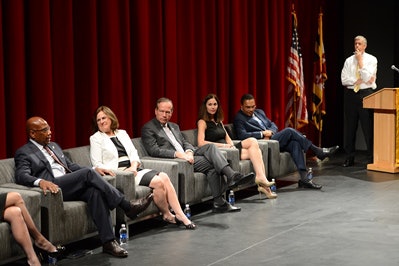 (R to L), Arne Duncan; UMBC President Freeman A. Hrabowski III; President of Davidson College Carol Quillen; F. King Alexander, president of Louisiana State University; LaGuardia Community College President Gail Mellow; Morgan State University President Dr. David Wilson
(R to L), Arne Duncan; UMBC President Freeman A. Hrabowski III; President of Davidson College Carol Quillen; F. King Alexander, president of Louisiana State University; LaGuardia Community College President Gail Mellow; Morgan State University President Dr. David WilsonAs Congress looks to reauthorize the Higher Education Act, U.S. Secretary of Education Arne Duncan Monday outlined the department’s intent to shift the focus in higher education to addressing issues around student success.
At a panel discussion hosted at the University of Maryland at Baltimore County, Duncan said that the focus on student success is “not just an economic imperative, but a moral necessity.”
“Ensuring the opportunity of college success for all students who are willing to work hard is a core tenet of the American covenant,” he said. “Unfortunately, for millions of … students, our higher education system isn’t delivering what they need, or deserve. As a nation, we can change that—and we must.”
“The challenge we face is easy to articulate, if not to solve. Today, the critical ticket to the middle class is a degree. … The simple fact is every hardworking student in this country must have a real opportunity to achieve a meaningful, affordable degree. America’s prosperity, our democracy and our identity as the land of opportunity and social mobility depend on it. … The idea for the past century that public education only goes from kindergarten to high school is over,” said Duncan, saying education must begin much earlier—in preschool—and continues through to ensuring post-secondary success.
Duncan acknowledged the skyrocketing cost of higher education, saying “the need is urgent to rein in the cost,” but said that more needs to be done to combat the inaccessibility of a degree for many families and emphasized the critical need for the conversation to not be limited to the discussion of college affordability.
“If we confine the discussion to cost and debt, we will have failed. Because we will have only found better ways to pay for a system that fails far too many of our students,” he said. “We must shift incentives at every level to focus on student success, not just access. When students win, everyone wins.”
In addition to affordability, Duncan said there are two other factors higher education administrators need to consider to help promote student success: “focusing much more on outcomes and … driving desperately needed innovation.”
The department will emphasize efforts “to make college more affordable, financial aid more accessible, and loan repayment easier. Second, we will concentrate on student success through shared responsibility and accountability through outcomes. And, third, we will promote innovation and competition and transparency” by incentivizing timely degree attainment.
Duncan addressed the value of degrees from “unethical schools” and “bad apples that saddle students with debt and worthless degrees” and the alarming dropout rates of students who start degree-granting programs but lack the support to continue through to the end. The secretary said it is important for institutions to consider the needs of nontraditional students: four out of 10 college students are over the age of 24, many juggle family responsibilities and the pressures of working full-time, and many are transfer students carrying credits from multiple institutions.
“The important thing to understand is that people on these campuses really do care about students,” said UMBC President Dr. Freeman Hrabowski. “Faculty and staff on these campuses really do care about students and have been able to help a lot of students already but need to help more, and we know, we know we can look in the mirror and say ‘yes, we can and need to do a better job.’”
Hrabowski said there is a need for “specificity in thinking about the kinds of students” that are being served. “Being able to specify the needs of those students, knowing the students well enough, having advocates for those students, taking the caring attitude that faculty and staff have been using, the technology that we have, and taking a system apart” to figure out how best to serve students “and being honest with ourselves about what we need to improve on can make a difference,” said Hrabowski.
Duncan said institutions need to be held accountable for student success. “When [students fail], every part of the system should share responsibility,” he said. “Today, only students, families and taxpayers lose when students don’t succeed—that makes no sense. Institutions must be held accountable when they get paid by students and taxpayers but fail to deliver a quality education. So should states and accreditors who are responsible to oversee them under the law.”
Davidson College President Dr. Carol Quillen said it is important to realize that increasing access and ensuring student success is not beneath schools and is not independent of maintaining an esteemed reputation. “Access is not in opposition to excellence,” she said, “but excellence requires access.”
“The theme should be knocking down the boundaries across sectors,” Hrabowski said. “The key … is to look at the culture of institutions to see what we are doing well and how to go about building upon what works and to be honest with ourselves about what does not work.”
LaGuardia Community College President Gail Mellow said it is critical that universities not get comfortable with benchmarks achieved but to realize that work still needs to be done.
“As good as we are and as much as we like to talk about our successes, they’re still at the micro level. And the only way we are going to take what works to scale is to decide what to do and what not to do,” said Mellow.
Quoting President Obama’s remarks to the NAACP conveners earlier this month, Duncan said, “‘Justice is not only the absence of oppression; it is the presence of opportunity.’”



















